What is a futurologist? Does a futurologist predict the future? What is the output of a futurologist? How does it work and how can it help a team, department or organization? What are useful models and systems? Read all about the work of a futurologist in this article!
In this article:
- Key Concepts and Definition
- Benefits of hiring a futurologist;
- Methods with my 5A model;
- Well-known futurologists 7x
- Future Studies 8x
- Core principles of a futurologist
- How can a futurologist help?
- Models and systems 5x
- Tips 3x
At the bottom of this article, you can leave a comment if you have a question or comment.
Other relevant articles on my blog include: futurist speaker / futurist technology / foresight driven organizations
What is the definition of the term futurologist?
Key Concepts in Futurology
Here are the key concepts in futurology:
Futurologist
A scientist who researches possible futures using systematic methods, data analysis, and scenario planning to help organizations prepare for upcoming changes. Unlike fortune tellers or predictors, futurologists use evidence-based approaches to explore multiple potential futures.
Futurology
The scientific field that explores, imagines, and evaluates possible, probable, and desirable futures through systematic research methods. Also known as futures studies or future research, it combines quantitative analysis with creative scenario development.
Future Studies
The academic discipline focused on the systematic and interdisciplinary study of potential future scenarios. Also referred to as Strategic Foresight Studies, it involves analyzing trends, developing scenarios, and identifying opportunities and risks.
Strategic Foresight
A structured and systematic approach to exploring and analyzing future developments, aimed at making better strategic decisions in the present. It combines trend analysis, scenario planning, and strategic thinking to prepare organizations for multiple possible futures.
Difference with futurist?
In practice, the terms futurologist and futurist are often used synonymously. And within this profession you can also focus on a domain, for exampla as a technology futurist. Another related term is trendwatching. The difference with a trend watcher is that a futurologist or futurist usually looks ahead over a longer time period and usually with more depth.
What is the definition of a futurologist?
Definition futurologist
The definition of a futurologist is ‘… someone who deals with an uncertain future in order to prepare people, organizations and society for possible changes that determine our future.’ (Van Duijne and Van der Wel, 2019)
A definition by Bell (1997) describes the field:
Futurology is a field that conceives, explores, imagines and evaluates possible, probable and desirable futures.
Bell, 1997
So a futurologist is not a forecaster or soothsayer. Indeed, the basic premise in futurology is that no one knows or can predict the future, but you can explore possible futures.
Futurologist speaker
Exploring futures is also my role on stage as a speaker. The basis of my presentations is an analysis of relevant developments in the field I am speaking about. Then my role is to examine the implications of those developments.
After this preliminary work, I think about how to share these insights with the audience in a creative way. This can be done through short stories, interactive exercises or discussion of a thesis statement. Ideally, the audience will work by themselves or with each other to translate the impressions into what they can do next. The goal: to ensure that their organization and the public itself are better prepared for the future.
In addition to this role as speaker, a futurologist may also perform other tasks. For example, as an advisor to spar with the board, management or innovation teams. Or in creative ventures, such as writing science fiction stories or a consulting role in art projects, series and films.
- NB. If you would like to hire me for a lecture or presentation on this topic, please contact me. Or check out the Trends 2040 page first for more information, examples and references.
What is a futurologist?
Thus, a futurologist is concerned with exploring the future, often in a specific field (e.g., radiology in a hospital), in a particular domain (such as local government), on a theme (e.g., music), focused on a company (e.g., Volkswagen) or department (such as customer service). This is what a futurologist does with a systematic method of research, imagination, and dialogue.
Van Duijne and Van der Wel (2019) add that futurology is about “a way of thinking. I personally describe that way of thinking as a mix of a few elements:
- pick up weak signals of change;
- Analyze clear and implied consequences of changes;
- see the big picture of changes at a system level.
But the most important element, as far as I am concerned, is curiosity: curiosity about the world, about new technologies, about emerging (sub)cultures, about other cultures and, above all, about people. What drives us as human beings, how we deal with change, and what we can do right now to shape a better future?

What are the benefits of hiring a futurologist?
Benefits of hiring a futurologist
What is the added value of a futurologist for your company or organization? In the scientific literature, researchers look not so much at the role of the futurologist, but mainly at methods used.
- Bodin, Chermack and Coons argue in their 2008 and 2016 studies that scenario planning helps companies make decisions more intuitively and creatively. This way seems to work better in a volatile, uncertain, complex and ambiguous (VUCA) environment.
- Phadnis and Joglekar show in their 2015 and 2021 studies that participants became more flexible in their investments. In addition, a company’s joint journey with their supplier identified a number of drivers that they had not recognized separately.
- Bouhalleb and Tapinos’ (2023) research shows that scenario planning allows companies to become more agile and adapt faster.
But what does doing futures research mean for the bottom line? René Rohrbeck and Menes Etingue Kum showed in 2018 that the companies that conduct strategic foresight are on average 33% more profitable and grow 200% faster than their competitors.

What is my approach as a futurologist?
Methods
What is my approach as a futurologist? In my assignments, I adhere to the Framework Foresight by Peter Bishop and Andy Hines. By the way, in 2023, I had the pleasure of attending a seminar by Peter Bishop in Kortrijk, Belgium.
These are the steps of my 5A-model:
- Anticipate: Determining the scope and timeframe. How far do we want to look ahead and which elements do we include?
- Analyze: Analyzing trends and signals, for example in my lecture trends 2040.
- Articulate: Developing future scenarios, for example, through scenario planning.
- Assess: Adjusting plans and strategies based on insights from the previous steps and conducting small experiments.
- Act: Continuously monitoring and adjusting the course. Foresight activities are never finished.
Do you want to know more? In this article about Futures Research I go through all of the steps. If you want to work with me: Strategic Foresight expert Peter Joosten.
As a metaphor, I often use the image of sailing or surfing. As an individual, team, department or organization, you have little leverage to influence the trends in themselves. Just as a sailor or surfer has no control over wind direction, wind speed and waves.
The trick is to foresee, assess and make the best use of these elements in the sailboat or surfboard. The same principle applies to future research and futurology: seeing development, estimating it, trying to avoid it or, on the contrary, taking advantage of it.
What are well-known futurologists?
Well-known futurologists (7x)
Well-known futurologists are Sir Arthur Charles Clarke, Alvin Toffler, Fred Polak, Faith Popcorn, Anab Jain, and Jane McGonigal.
- Sir Arthur Charles Clarke (1917 – 2008) was an English writer of science fiction books, television show host and inventor. His best-known book is 2001: A Space Odyssey, which was filmed in 1968.
- Alvin Toffler (1928 – 2016) was an American publicist and futurologist. His best-known book is 1970’s Future Shock. The title of the book describes a situation in which (too) much changes in a short period of time. Partly because of this book, Future Shock is still a well-known term in futures research.
- Fred Polak (1907-1985) is considered one of the founders of modern futurology.
- Faith Popcorn (b. 1943) is an American author and founder of the marketing consulting firm BrianReserve. She is best known for introducing the term Cocooning. This is the impulse to stay mostly inside and live as comfortably as possible.
- Indian Anab Jain (b. 1976) founded the design Superflux with her partner Jon Ardern. The strength of her approach is that she makes life in the future tangible and concrete through films, books, installations and experiences.
- Jane McGonigal (b. 1977) is an American game designer and researcher at Institute for the Future, United States. In 2022, she released the book Imaginable.
I myself am also a futurologist. I do this mainly with my future and trend research, lecturing, consulting, and giving workshops. Are you interested in working with me? If so, please contact me!
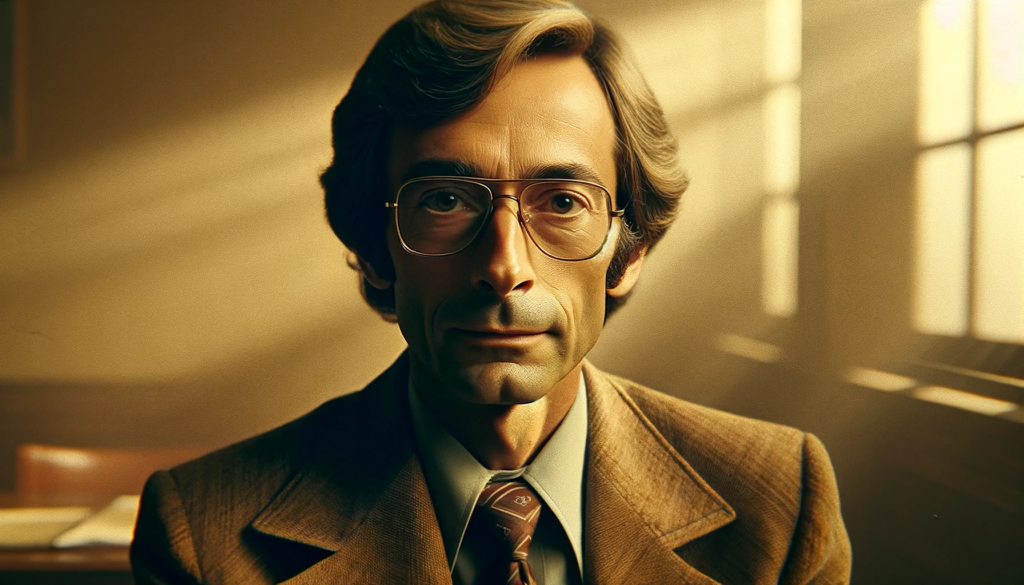
What are relevant training institutions in futurology?
Future studies 8x
Future studies is concerned with exploring the future. By the way, it is not true that you are not a futurologist until you have completed a course in future studies. Another terms for Future Studies is Futures Research and Strategic Foresight Studies.
These are some institutions and courses:
- Copenhagen Institute for Future Studies (Denmark) – I did my course on Applied Strategic Foresight at this institute.
- Edinburgh Futures Institute (Scotland);
- Institute for the Future (United States);
- University of Houston Foresight (United States);
- University of Hawaii Research Centre for Future Studies (United States);
- ICFS International Certified Future Strategist (Sweden);
- SOIF Foresight Training (England) ;
- TFSX, The Futures School (United States);
Do you like to add a course in Future Studies, Futures Research or Strategic Foresight? Leave a comment, and I will add it to this list.
I myself am also involved in a number of courses as an lecturer. For example, I am involved as a lecturer in the course Future Studies at the Hogeschool Windesheim in Zwolle and I am a guest lecturer in the master Human Technology Interaction at the TU Eindhoven (both in the Netherlands).
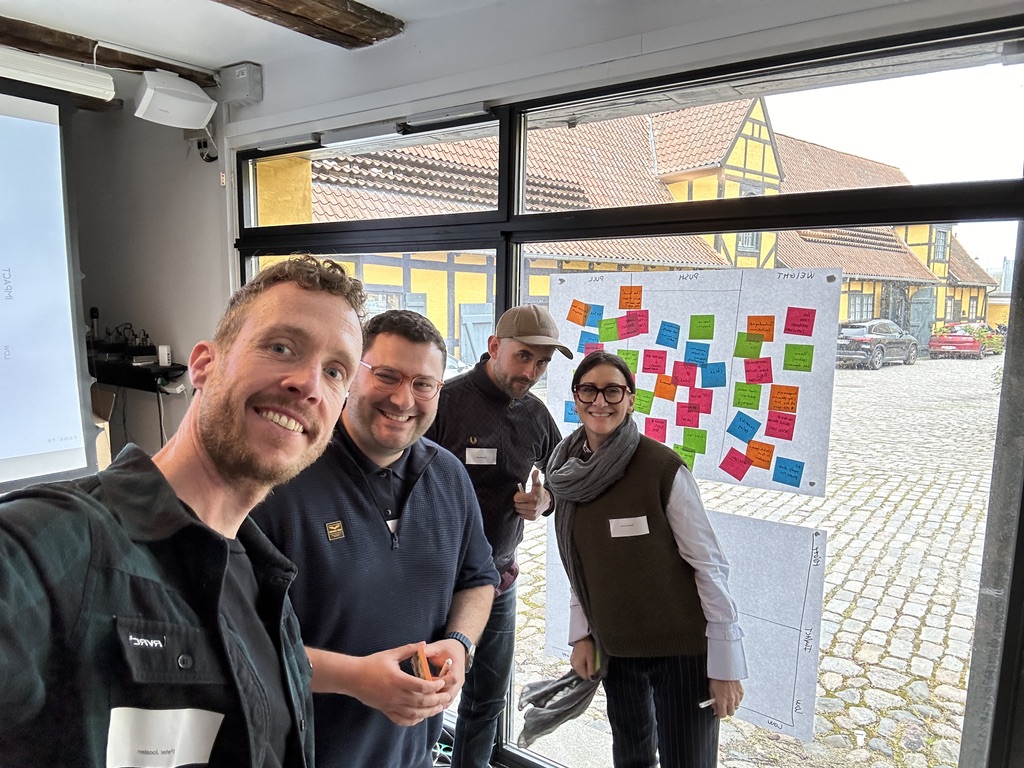
Ways in which a futurologist can help.
How a futurologist can help
These are some of the ways a futurologist can help with future research, lectures or to make an organization more future oriented.
- A lecture;
- A scenario planning workshop;
- Innovation Labs;
- Building future-oriented organization.
By the way, if you would like to talk to me about any of these forms, please contact me!
Lecture
A lecture is an energetic, interactive presentation in which a futurologist outlines the most relevant developments in a particular field. Most presentations are between 30 and 90 minutes. I myself regularly do this kind of reading, for example trends 2040.
Scenario planning workshop
A scenario planning workshop usually lasts longer than a lecture, often between 90 and 120 minutes. Relative to a lecture, what stands out is not only the time difference, but especially the role of the audience.
At a workshop, I usually provide a kickoff, but participants actively engage in sketching future scenarios themselves. It requires more of the participants, but the advantage is that they are actively learning as they work with each other.
Innovation Lab
Innovation labs are separate departments or teams at companies engaged in future research, exploration, strategic consulting and/or innovation projects. A futurologist can work at the lab or be temporarily hooked up depending on a project. For example, I myself was involved in a range of these kinds of labs.
The advantage of a separate organizational unit is that a group of employees can focus exclusively on foresight. One drawback is that the insights and ideas do not stick as well with other colleagues. A research or project comes to life when you put time and energy into it, reflect, build on others’ ideas, and discuss.
Future-oriented organization
Another way a futurologist can help is as a consultant to make an organization more future-oriented, future-proof or foresight driven.
Indeed, future-oriented thinking and working demands a lot from the organization and its employees. The challenge is that it is not just a nice lecture or workshop, but that it sticks and encourages people to have new ideas, a different perspective and a different way of working.
Change is difficult. Something I recognize from my experience: most change comes about despite change management. After all, we cannot force people to think and work differently. At most, we can create the preconditions for people to take steps in this from intrinsic motivation.
Expeditions
Professor Jan Rotmans therefore proposes organic support base development: starting with people who are open to it, and thus creating a larger support base step by step.
For that reason, I don’t do traditional consulting (anymore). My approach is primarily to teach employees how to do it themselves. For that reason, I prefer to call my contribution a learning course, boot camp or future expedition.
These terms better reflect our common quest. After all, we cannot predict the future. A learning process is therefore a good way to explore the future with each other in a safe environment.
Expeditions often consist of several meetings. Participants preferably come from all levels of the organization, from implementation to strategic thinkers, board and management. Each expedition is customized, so if you want to know more contact me.
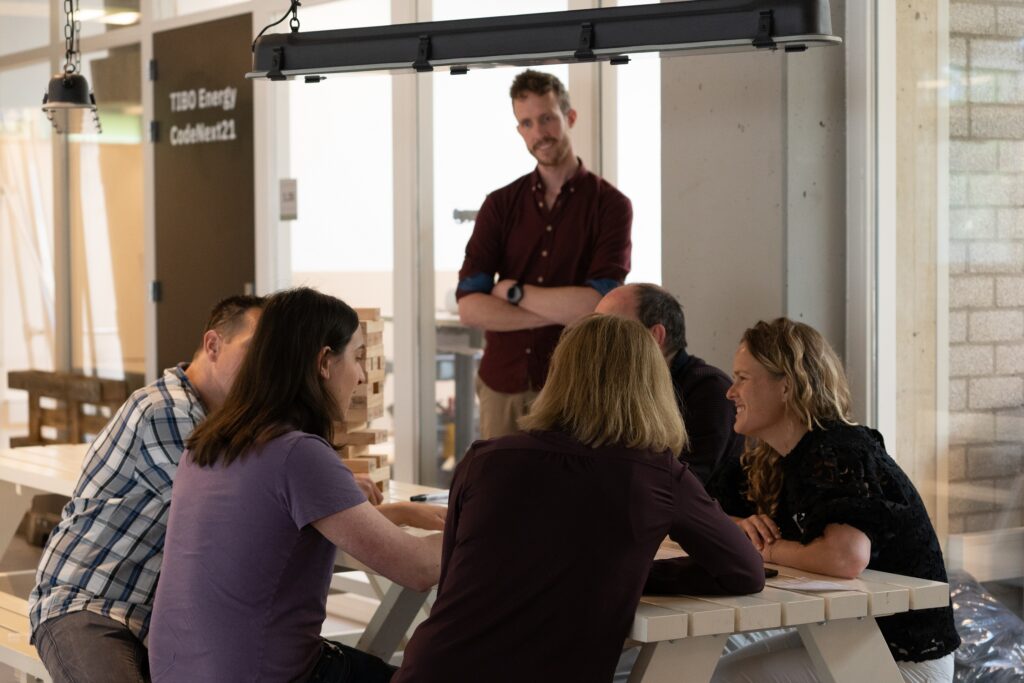
What are the core principles of a futurologist?
How a Futurologist Thinks: 4 Core Principles
As a futurologist, I use specific mindsets that go beyond traditional strategic planning to explore and research the future. The core principles in my field are Dator’s Law, positive and negative imagination, urgent optimism, and the understanding that the future cannot be predicted.
1. Dator’s Law
A fundamental principle in futurology, named after Professor Jim Dator, states:
“Any useful statement about the future should appear ridiculous at first sight.”
I use this law in my work to challenge both myself and my clients to look beyond current assumptions. If a future scenario sounds immediately plausible, it’s likely too heavily based on extending current trends rather than considering truly transformative changes.
2. Positive and Negative Imagination
As a futurologist, I employ both positive and negative imagination in future explorations:
- Positive imagination involves searching for opportunities and possibilities. This exercise helps build confidence in the future.
- Negative imagination explores risks and challenges. Thinking and talking about these helps build resilience.
By combining both exercises, we’re less likely to fall into either blind optimism or paralyzing pessimism.
3. Urgent Optimism
A crucial mindset I aim to develop in organizations is ‘urgent optimism.’ This balanced approach acknowledges that significant challenges and risks lie ahead while maintaining realistic hope that we can address these challenges and risks.
I’ve found this principle helps organizations take proactive action toward the future, rather than becoming paralyzed by concerns or dismissing them casually.
There’s even an online community dedicated to urgent optimism, where practitioners share insights and approaches.
4. Predicting the future is impossible
Despite being able to think well about the future, it is still difficult to predict it. There are plenty of great examples, like this one:
- In 1894, the English newspaper The Times predicted that by 1950 all of London’s streets would be buried under meters of horse manure.
- An international conference on the problem of horse manure was even organized in 1898. The conclusion after a week of meetings: it is an unsolvable problem. Few at the time had reckoned with the breakthrough of the automobile.
- Ernest Rutherford was one of the greatest nuclear physicists of his time. He said in 1933 that nuclear power was “drivel in space,” then less than 24 hours later Leo Szilard discovered the nuclear chain reaction.
- Astronomer Richard Woolley in 1956 called stories about space travel “utter nonsense. A year later, the Soviet Union put the first satellite into orbit.
Let alone knowing the consequences of scientific and technological breakthroughs.The best summary of this effect comes from philosopher Bruno Latour:
Unexpected consequences are the most predictable thing on earth.
Bruno Latour, philosopher
This is also why I often come back to this statement, “A futurologist cannot predict the future. He or she can, however, help you imagine different futures and think about what you can do something about (or with) them now.

Models and systems for foresight
Models for foresight (5x)
What are models and systems that futurologists use? These are some models that I myself often use in my work.
- Futures Literacy
- Futures Consciousness
- Transit Science
- Co-Emerging Futures
- Technology Pyramid
1. Futures Literacy
Futures Literacy is the ability to actively envision, imagine and represent the future. The term literacy was chosen for a reason. Indeed, according to UNESCO, it is a skill that everyone can and even should acquire.
It is the skill that allows people to better understand the role of the future in what they see and do.
Definition of Futures Literacy
An important factor within the methodology is equality, diversity and inclusiveness. Indeed, according to this article, visions of the future are often limited by the prevailing culture. Think of capitalism or other dominant paradigms.
Therefore, the goal of Futures Literacy is to involve as many people from diverse backgrounds as possible in thinking about the future, in order to get a wide variety of ideas and visions.
2. Futures Consciousness
Futures Consciousness, or future awareness, is similar to Futures Literacy. Scientists from the University of Turku (Finland) and Geneva (Switzerland) developed this methodology.
Futures consciousness is the human capacity to understand, anticipate, prepare for, and embrace the future.
Definition of Futures Consciousness
The goal of Futures Consciousness is to is proactive and anticipatory with the future rather than reactive and fatalistic. The idea, as with Futures Literacy, is that the future is not fixed but is determined by the choices we make now.
The method includes five dimensions:
- Time perspective;
- Awareness of responsibility;
- Openness to alternatives;
- System perception;
- Caring for others.
Personally, I like this model better than Futures Literacy. Why?
- The dimensions of Futures Consciousness encompass more facets, which is why I find it more applicable to teams, departments and organizations.
- You can map the degree of future awareness with a questionnaire, allowing for a baseline measurement and a measurement after a workshop or advisory process.
On the other hand, this Finnish-Swiss model demands more from users. Future literacy is a bit more low-key. Therefore, I usually start with that, followed by Futures Consciousness if it fits the assignment.
3. Transformation Sciences
How do radical and irreversible overturns of systems occur in society? Jan Rotmans, professor of Transformation Sciences at Erasmus University in the Netherlands, examines how these tilts can be steered and influenced.
Transformation Science is the science that shows how transitions (radical and irreversible overturns of systems in society) come about and how they are managed.
Definition of transition science by professor Jan Rotmans
According to Rotmans, chaos is necessary to move forward in a transition. The present time also feels chaotic at times, but that is because we are in a number of transitions.
Such a phase of chaos is characterized by resistance, resistance, protests and lack of understanding and overview. It could seemingly go either way. We are in that tipping phase now.
Transitions don’t always succeed
Currently, the best-known tilt is the energy transition. Society is switching from fossil sources such as oil, coal and natural gas to clean fuels such as solar and wind power. Upcoming transitions according to Rotmans involve agriculture, commodities, the circular economy, education and health care.
Incidentally, Rotmans does not argue that all changes, transitions and tilts succeed anyway. The current system, with all its interests and power, may eventually adapt or still remain too strong.
4. Co-Emerging Futures
Reon Brand is Design Principal Foresight & Social-cultural trends at Philips Research. In 2019, he and his colleagues released the Co-Emerging Futures study. His goal was to explore post-anthropocentric futures. These are futures beyond man as the center of everything.
The research consists of two paths, two mindsets and four possible and simultaneously evolving futures.
- Etheria, a future in which man lives on without the need for a biological body.
- Immortalia, a movement that reflects man’s obsession with living longer and longer and eventually becoming immortal.
- Habitania, a quest to create sustainable prosperity through efficient use of natural resources.
- Gaia, a future that assumes ecocentrism, all life and the planet are one system.
I recognize the futures Etheria and Immortalia from my research on transhumanism. Habitania has attracted more attention in recent years, including, for example, Robinson’s book The Ministry for the Future. Finally, Gaia reminded me of the ideas from Jeremy Lent’s The Web of Meaning.
I use this method especially with clients who want a more philosophical and speculative conversation about the future. Then the four flows from the Co-Emerging Futures are useful because they are set at a higher level of abstraction.
5. Technology pyramid
Designer and artist Koert van Mensvoort elaborated on the technology pyramid in his book Next Nature. With this model, he hopes to identify the different levels at which technology functions. The pyramid is a tool for scientists, inventors, engineers, designers and entrepreneurs.
The pyramid makes it clear that at first glance, new technologies often seem artificial, strange and unaccustomed. But as a technology climbs the pyramid, they become more accepted, taken for granted, indispensable, or even feel natural.
A few examples:
- A space journey lasting generations is a technology only in the imagination stage.
- Nuclear fusion is in the operational phase.
- An example of accepted technology is the cell phone (perhaps already on the brink to indispensable).
- As a technology, a table and a chair are actually already invisible.
- At the level of natural, you can think of clothing or agriculture.
I like to use this model with scientists, engineers and designers to think about how the technology they are working on can evolve.
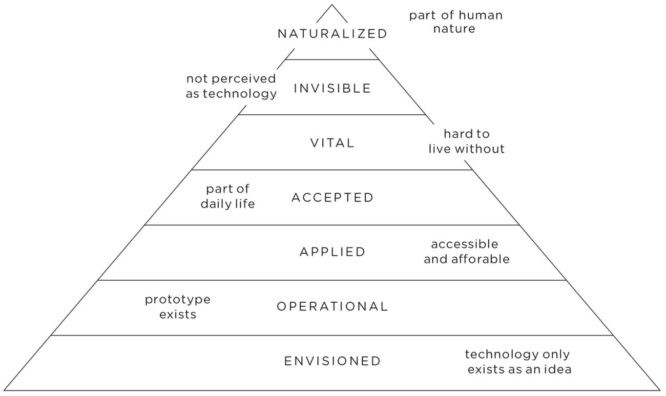
Tips for thinking more like a futurologist.
Concrete tips
What are some tips for thinking and acting more forward-looking? In other words, to become a bit of a futurologist as well? These are the three steps: scan signals, share insights and delve into futurology.
1. Scanning signals
Take time each week to look for signals about the future of your industry, policy area or industry. This need not take a lot of time. For example, you might resolve to spend 10 minutes every week on Tuesday mornings reading about relevant developments.
In terms of current events, I like newsletters and podcasts best. These are my recommendations for newsletters:
- Exponential View by Azeem Azar;
- News from the Future from the ITFT;
- Newsletter Stories from the Future, by yours truly.
Would you rather listen to a podcast? For example, on your way to work? These are my tips:
- Lex Fridman podcast;
- Future Now podcast;
- After On podcast.
Do you have any good tips of your own? Leave a comment!
2. Sharing
Even better than just scanning signals and developments, is sharing your insights with your colleagues, manager or director. Some organizations I worked for had this on the agenda periodically. The question then becomes, “Have you read, heard, seen or picked up anything recently that is relevant to the future of our team?
But signal sharing does not have to be (only) formal. You can also share your insights with your colleagues over lunch or at the coffee machine.
In addition to an informal conversation or a place on the agenda, some organizations are setting up a Signals Club. Such as the bank Meritrust Credit Union (United States) or the Institute for Research on Public Policy (Canada).
The format is simple: any colleague may participate. The club meets every few weeks, physically or online. Members discuss what signals they have picked up, whether there are counter movements, what biases may be at play, what to do with the signals and how to continue to monitor them.
3. Delve into futurology
Are you curious about the methodology and all forms of work within futurology? Then there are plenty of sources for deepening your knowledge about futurology.
These are the best books this I have read so far on futurology:
- Book Thinking about the Future by Peter Bischop and Andy Hines;
- Book Imaginable by Jane McConigal;
- Book Facing our Futures by Nicolas Badminton.
Here you find a complete overview: book tips future studies.
You can also join professional associations of futurologists. For example, the Association of Professional Futurists (APF).
Do you have a question for me as a futurologist? Leave a comment!
PS. If you would like to hire me for a lecture or presentation on this topic, please contact me. Or check out the Trends 2040 page first for more information, examples and references.



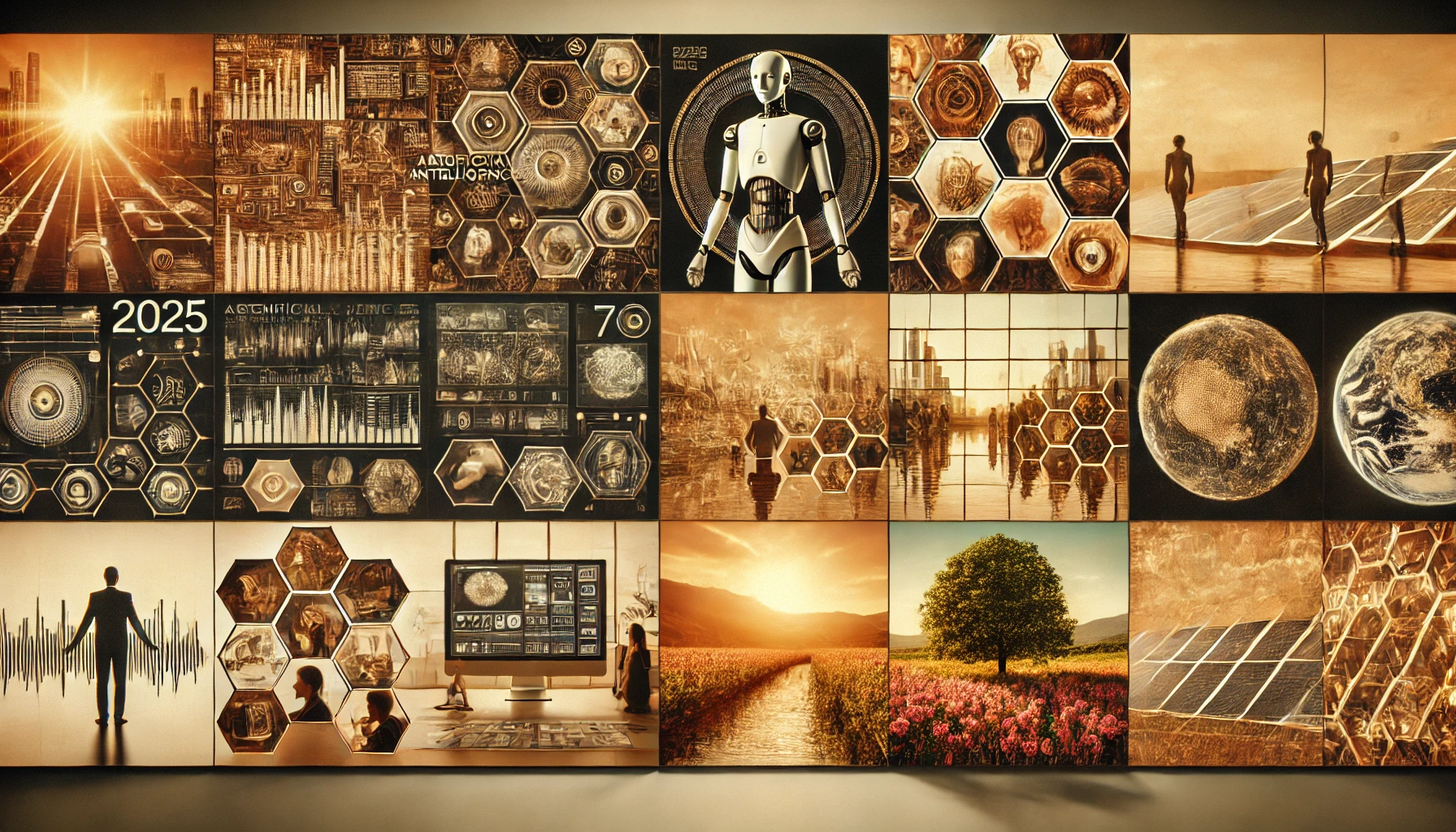


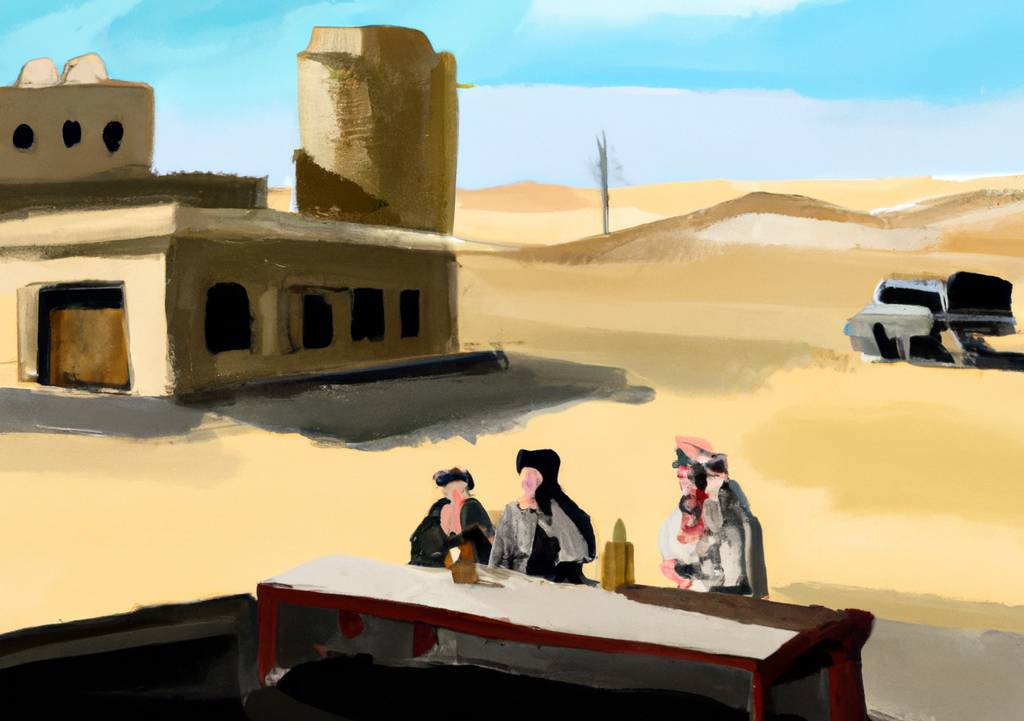
Leave A Comment